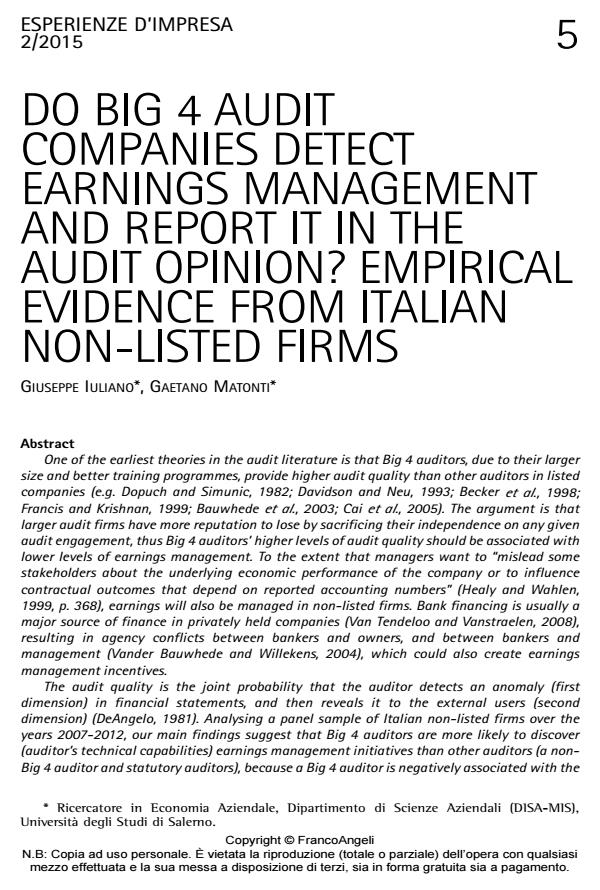Do big 4 audit companies detect earnings management and report it in the audit opinion? Empirical evidence from italian non-listed firms
Journal title ESPERIENZE D'IMPRESA
Author/s Giuseppe Iuliano, Gaetano Matonti
Publishing Year 2017 Issue 2015/2
Language English Pages 39 P. 5-43 File size 250 KB
DOI 10.3280/EI2015-002001
DOI is like a bar code for intellectual property: to have more infomation
click here
Below, you can see the article first page
If you want to buy this article in PDF format, you can do it, following the instructions to buy download credits

FrancoAngeli is member of Publishers International Linking Association, Inc (PILA), a not-for-profit association which run the CrossRef service enabling links to and from online scholarly content.
One of the earliest theories in the audit literature is that Big 4 auditors, due to their larger size and better training programmes, provide higher audit quality than other auditors in listed companies (e.g. Dopuch and Simunic, 1982; Davidson and Neu, 1993; Becker et al., 1998; Francis and Krishnan, 1999; Bauwhede et al., 2003; Cai et al., 2005). The argument is that larger audit firms have more reputation to lose by sacrificing their independence on any given audit engagement, thus Big 4 auditors’ higher levels of audit quality should be associated with lower levels of earnings management. To the extent that managers want to "mislead some stakeholders about the underlying economic performance of the company or to influence contractual outcomes that depend on reported accounting numbers" (Healy and Wahlen, 1999, p. 368), earnings will also be managed in non-listed firms. Bank financing is usually a major source of finance in privately held companies (Van Tendeloo and Vanstraelen, 2008), resulting in agency conflicts between bankers and owners, and between bankers and management (Vander Bauwhede and Willekens, 2004), which could also create earnings management incentives. The audit quality is the joint probability that the auditor detects an anomaly (first dimension) in financial statements, and then reveals it to the external users (second dimension) (DeAngelo, 1981). Analysing a panel sample of Italian non-listed firms over the years 2007-2012, our main findings suggest that Big 4 auditors are more likely to discover (auditor’s technical capabilities) earnings management initiatives than other auditors (a non- Big 4 auditor and statutory auditors), because a Big 4 auditor is negatively associated with the absolute value of discretionary accruals (Jones, 1991; Dechow et al., 1995). Analysing the same sample firms, a logistic panel regression suggests that, according to previous literature, the absolute value of discretionary accruals is positively associated with the probability that a qualified audit report is issued, meaning that the absolute value of discretionary accruals explains the issuance of qualified opinion for materially misstated financial statements. The panel logistic regression also suggests that the association of the absolute value of discretionary accruals and of a Big 4 auditor is positively associated with the probability that a qualified audit opinion is issued, meaning that when a Big 4 auditor discovers an accounting anomaly in the financial statements, it is reported in the audit opinion (auditor independence). Our findings also show that the audit opinion in previous years also affects, on average, the audit opinion of the year of the analysis.
Keywords: Earnings management, audit opinion, non-listed firms. First submission: 07.03.2016, accepted: 13.12.2016
Giuseppe Iuliano, Gaetano Matonti, Do big 4 audit companies detect earnings management and report it in the audit opinion? Empirical evidence from italian non-listed firms in "ESPERIENZE D'IMPRESA" 2/2015, pp 5-43, DOI: 10.3280/EI2015-002001